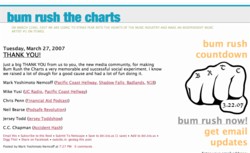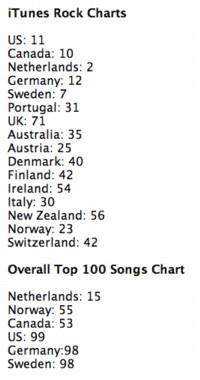 Instead of tacking on an update to my original posts here and here about Bum Rush The Charts, I thought I would throw a few more thoughts into the aftermath that was. After all, I helped promote this event/movement, and you probably assume thoughts that I have on it. Yes, I liked the concept, but the discussion in the spheres of blogging and podcasting urges me to think out loud a little bit more.
Instead of tacking on an update to my original posts here and here about Bum Rush The Charts, I thought I would throw a few more thoughts into the aftermath that was. After all, I helped promote this event/movement, and you probably assume thoughts that I have on it. Yes, I liked the concept, but the discussion in the spheres of blogging and podcasting urges me to think out loud a little bit more.
GZExpat is a long time, non-supporter of all things iTunes, and The Reverend Don Deeley has presented me with numerous theories of everything that is wrong with DRM[wiki], which is what every single thing you can buy from the iTunes Music Store is laced with. It’s that thing that prevents you from duplicating, copying, or moving the file in which you purchased within certain parameters.
Some people are unaffected by this, but that’s like saying you can drive the car that you bought here and here, but you can’t drive it here, park it there, or you have to give up your car after you drove it for six months. So let me be in agreement, I am all for opening up DRM across the board, just like what Steve Jobs proposed in his little white paper that he lofted at the music industry nearly two months ago.
 In a slight manner of speaking, that is what BRTC was about, except it goes a little further than this. The ultimate goal was to push an independent artist to the top of the iTunes charts. It fell short, but the results still showed an effect. Will major music executives care? Probably not, but it shows that independent media can push independent music in a user driven capacity.
In a slight manner of speaking, that is what BRTC was about, except it goes a little further than this. The ultimate goal was to push an independent artist to the top of the iTunes charts. It fell short, but the results still showed an effect. Will major music executives care? Probably not, but it shows that independent media can push independent music in a user driven capacity.
Don’t think for a minute that Billboard Music Charts[wiki] work this way. The only reason someone sits on top of that chart is because of the millions of dollars that is spent on marketing that artist. It’s a funneling of big music pushing their focused, narrowed down product to big radio networks who only play a certain amount of artists in their regular rotation on the hot hits stations. It’s what they want to sell and make the maximum amount of profit, not necessarily what you should or want to hear. And if you find that hard to believe, remember when ska was hot? Don’t hear that much on the radio these days because some marketing trend guru says the most amount of profit potential lies in some other genre.
Dave Slusher made a post as to why he was abstaining from BRTC, and I completely respect the idea he presented. However, the aspect of getting respect from traditional or mainstream media is not the reason I bought into this. If anything, I saw this as a really great experiment of what is possible through the combination of blogging, podcasting, and combining that with independent music.
In the end, it proved that it has the potential of being very effective. You can argue all you want about the over all method, but science works the same way. You run an experiment, test the results, and then look another way to test the hypothesis in order to validate your data. That’s not to say that this will happen again anytime soon, but no one can say with complete sincerity that this trial produced some results that are worth raising an eyebrow at.

I really like the idea…like you said, I just don’t like the doorway that was set for everyone to make this push.
Just like news and information, music is being discovered through the internet more and more. I am hearing and finding so much good music through RadioZoom and Insomnia Radio, that its a bit frustrating for me that I cannot get the CD’s or download entire albums of these artists easily. I guess I am still of the old mindset…if I am going to buy a song from an artist…I will buy the album. I have never liked buying ‘singles’. So, if I hear one good song on a podcast, I want the whole album so I can hear what that band is all about.
Good luck with the job search.